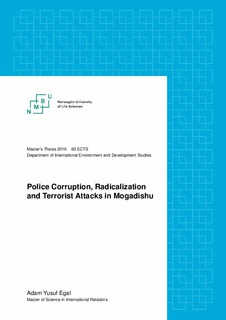| dc.description.abstract | Recently, the emergence al Shabaab combined with weak state structures has created
a challenging environment dazzled by a rampant police corruption, radicalization, and
terrorism. Much so, most of these issues has been more apparent in Mogadishu than
elsewhere in Somalia. This study was carried out: to discover the relationship between police corruption, radicalization and terrorist attacks in Mogadishu, reasons behind police
corruption, the influence of salary on corruption and contributing factors of radicalization and al Shabaab recruitment.
The study found that police corruption plays a major role in facilitating terrorist
attacks in Mogadishu through bribing the police, al Shabaab can easily launch attacks in well-secured places where government security including the police are present.
In the same way, police corruption turns people to become radicalized in the sense
that police use excessive force, abuse, and physical violence, humiliation against publics and minority clans, which creates a situation of feeling injustice, discrimination and
marginalization, which in turn leads to search for revenge. Through revenge, seeking
minorities end up by joining al Shabaab, which seems to be the only power that can confront the government and its allies. Irregular/low payments for police officers was also found exposing police officers to slip in corruption acts. Among factors that push people to
radicalization and Shabaab recruitment comprise socio-economic, youth political grievance, economic and social grievances.
Finally, the study proposes that social movement together with relative deprivation/oppression and humiliation-revenge theory can contribute understanding the
process of radicalization and recruitment in Somalia. While organizational theory of police
corruption has, a significant advantage over the psychological, sociological theories of police corruption presented and discussed in this study. | nb_NO |
